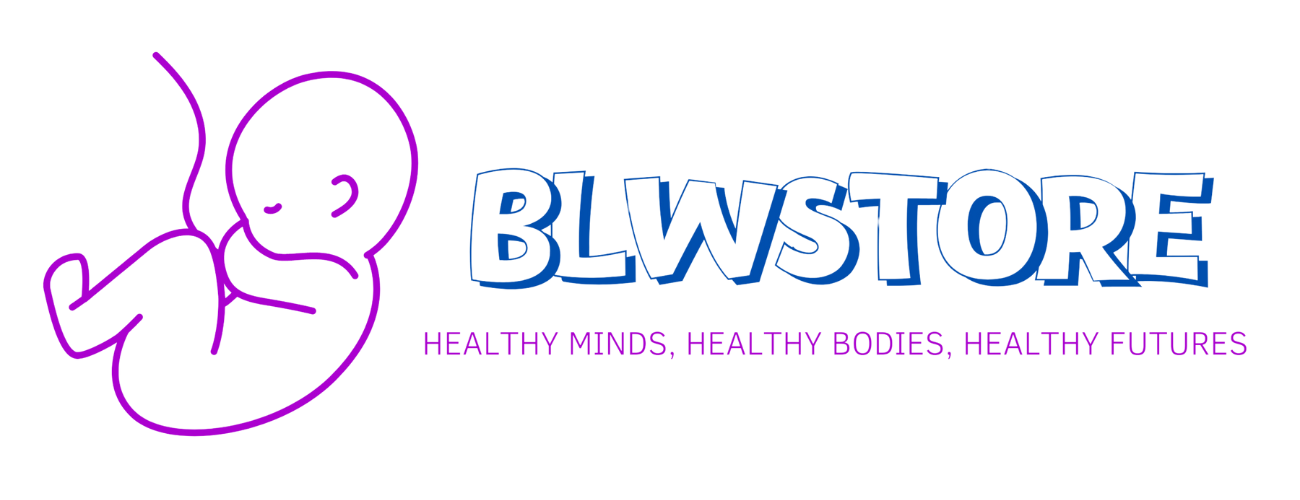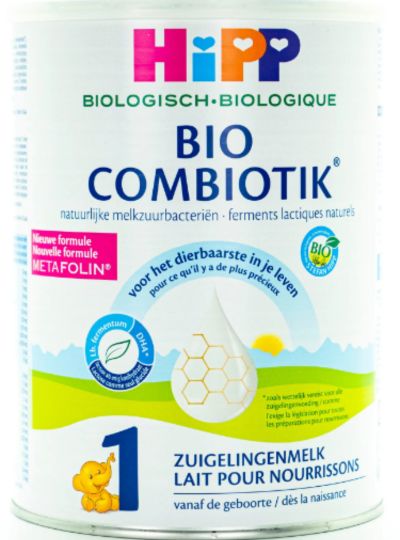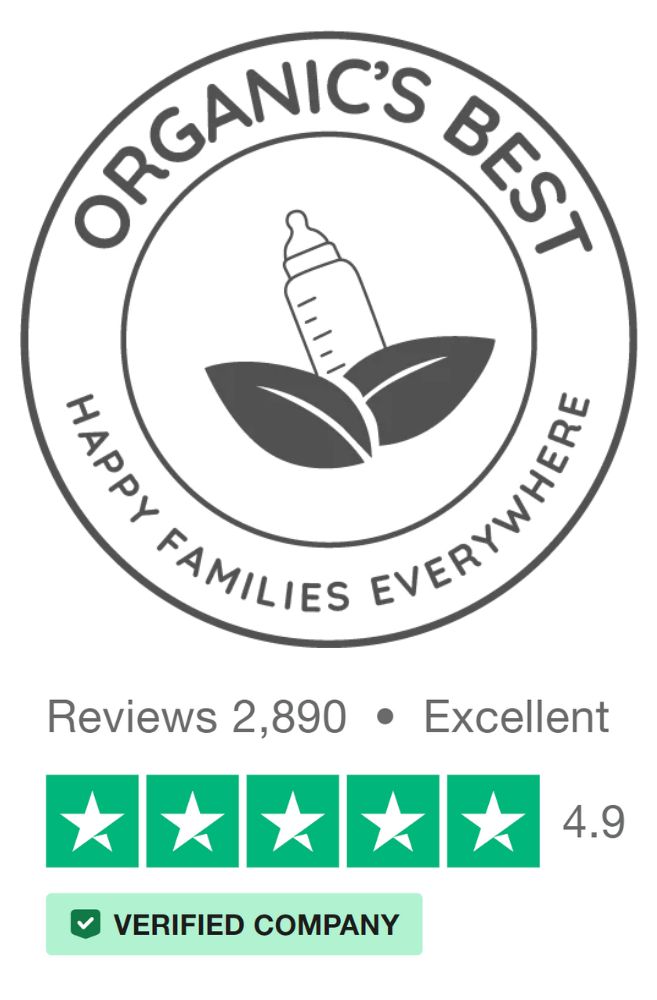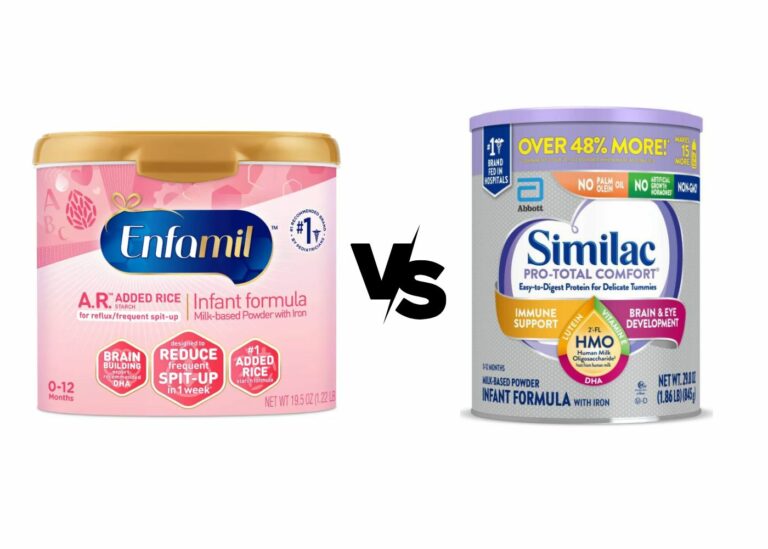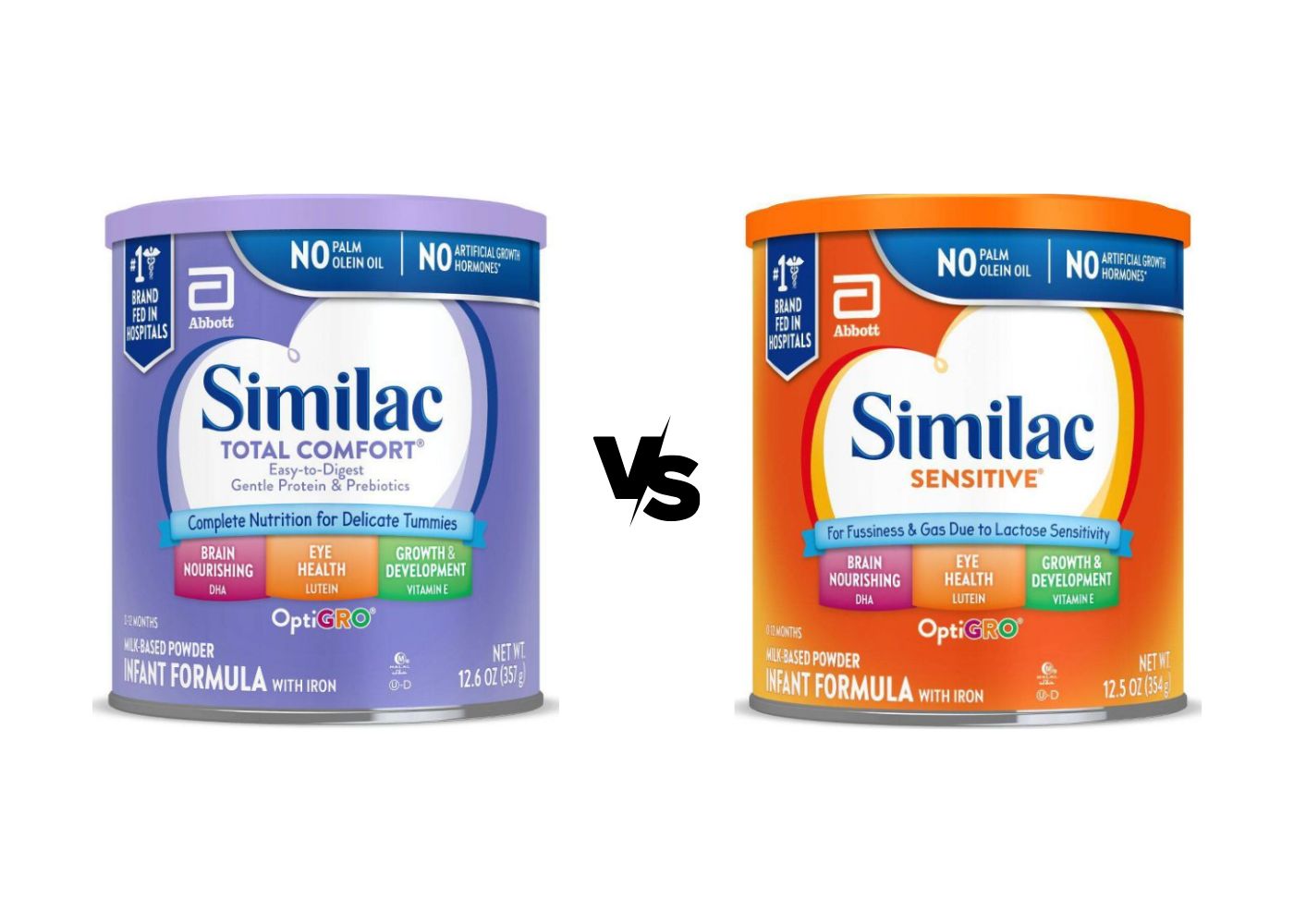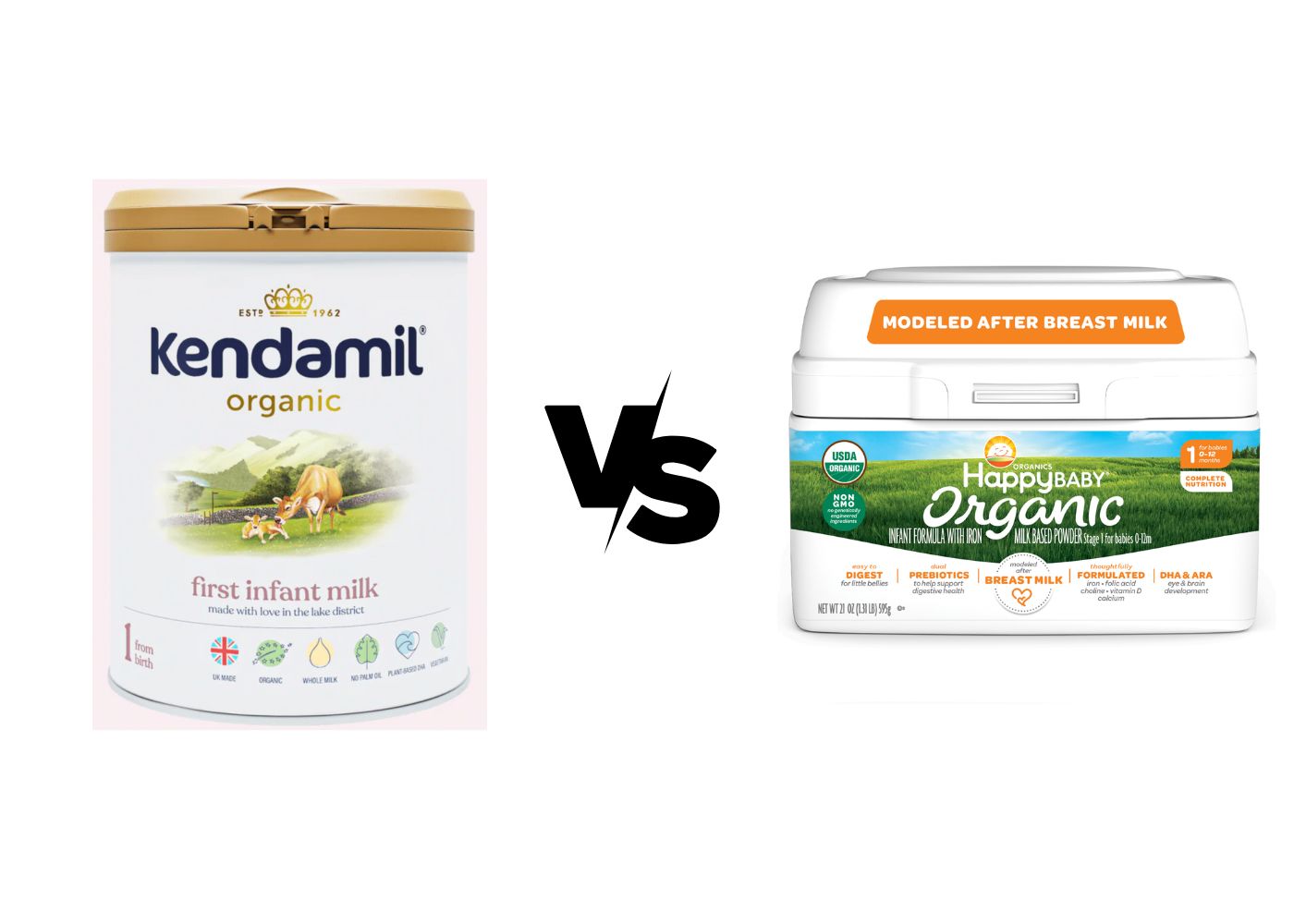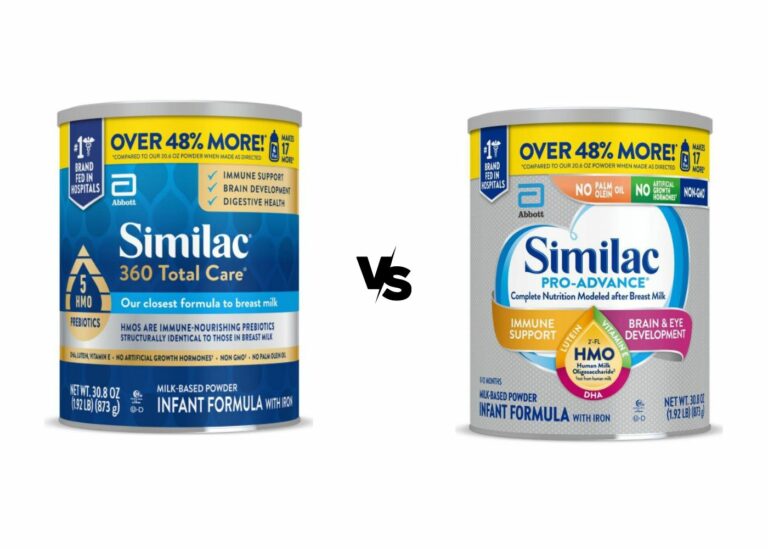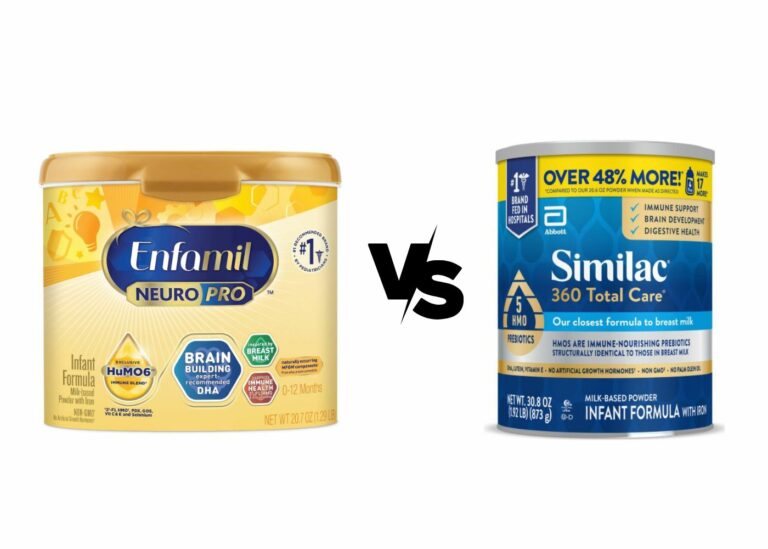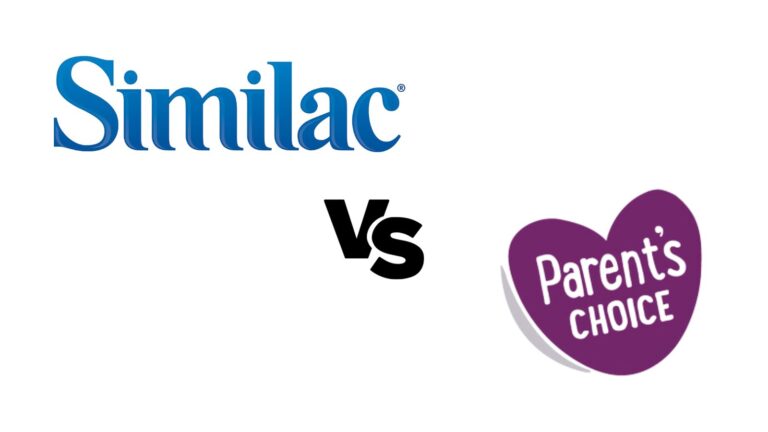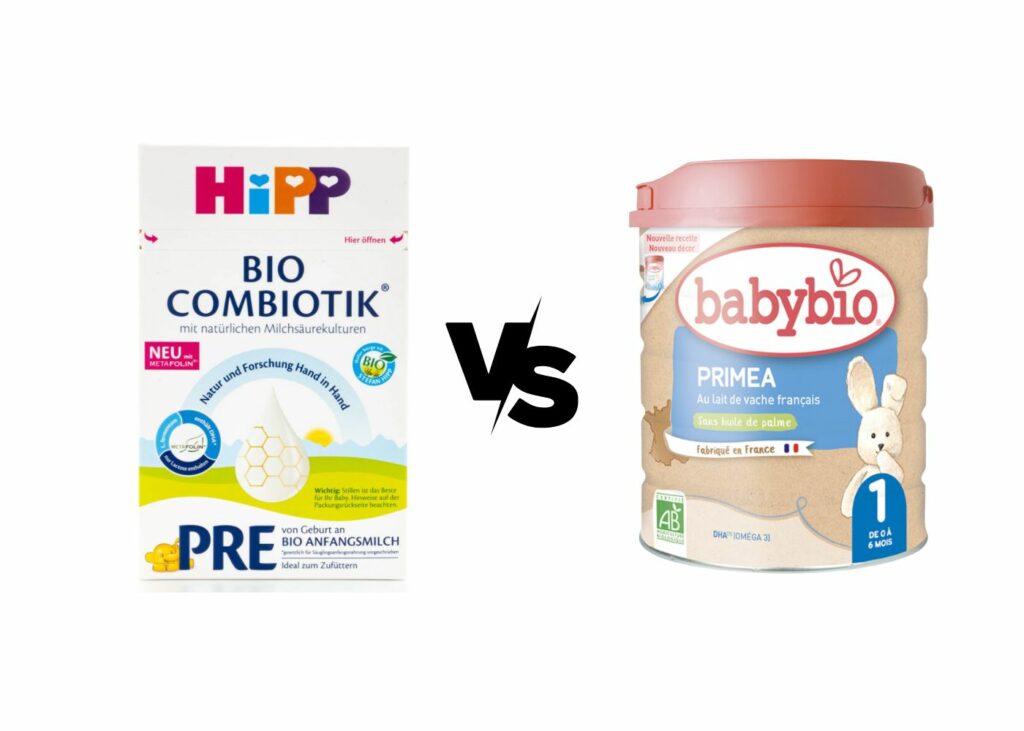
Key Differences Between Hipp and Babybio
| Key Differences | Hipp | Babybio |
|---|---|---|
| Origin | Germany | France |
| Farming Practices | Organic and sustainable farming | Organic and ethical farming |
| Brand Reputation | Mimics breast milk, stages for each developmental milestone | Focus on local sourcing, stages for each developmental milestone |
| Milk Source | Organic skim milk and whey | Organic skim milk and demineralized whey |
| Protein Content | 1.28g per 100ml | 1.28g per 100ml |
| Carbohydrate Content | Lactose from milk, 7g per 100ml (Hipp Pre only) | Lactose and maltodextrin, 7.9g per 100ml |
| Fats and Oils | Organic vegetable oils (including palm oil), and fish oil, 3.6g of fat per 100ml | Vegetable oils, fish oil, and unique Mortierella Alpina Oil, 3.1g of fat per 100ml |
| Omega Fatty Acids | Omega-6 (ARA) and Omega-3 (DHA) fatty acids | Omega-6 (ARA) and Omega-3 (DHA) fatty acids |
| Prebiotics and Probiotics | Contains probiotic lactic acid cultures and prebiotics (GOS) | None |
| Best Places to Buy | The Milky Box, My Organic Company (with a 5% off code: BLWSTORE) | dutchbabyshop for US buyers |
| Best Alternatives | Kendamil, Bobbie, Holle | Kendamil, Bobbie, Holle |
Blwstore is supported by its audience. When you buy through links on our site, we may earn an affiliate commission.
This article will compare two strong formulas: Hipp vs. Babybio.
We will face Hipp Combiotik Pre vs Babybio Primea. Both formulas are designed for babies aged 0-6 months; that way, the comparison is fair and makes sense.
Having said that, the conclusions from this comparison can also be applied to other formulas from the same two brands, since the ingredients used do not change a lot.
Let’s get after it!
Our Short Answer
Both Hipp Pre and Babybio are two very powerful formulas, with many pros, organic ingredients and very good feedback from many parents.
However, if we had to choose one, Hipp would come out on top.
This is due to its use of prebiotics and probiotics, making your baby’s microbiota as strong and healthy as possible, which affects not only their digestive system but their immune system as well.
That said, if the fact that Hipp has palm oil (even if it is organic) turns you off, then Babybio is also a very good option.
Hipp formula is the best to provide your baby with a wholesome and easily digestible formula.
- Breastmilk-Like Composition: Natural probiotic lactic acid cultures from real breast milk and lactose as the main carbohydrate.
- EU Organic Certified: Sourced from biodynamic farms.
- Nutrient-Enriched: Contains prebiotics (GOS) and essential fatty acids (DHA & ARA)
- Allergen-Free: Free from artificial sweeteners, GMOs, gluten, soy, peanuts, and eggs.
At BLWStore, we may earn a commission from some of the products featured on our website through affiliate partnerships with retailers. We want to be transparent with our readers and let you know that we do not receive any products for special consideration. The commission we earn helps support our website and allows us to continue providing helpful information and product recommendations. Thank you for your support!
Brand Reputation
HiPP: Well-renowned for high-quality, nutritionally balanced formulas. Strong commitment to organic farming, mimicking breast milk. Formulas for every developmental milestone.
Babybio: Trusted brand with a focus on organic and ethical farming. Skimmed milk sourced from French cows. Formulas meet infants’ nutritional needs at different growth phases.
Hipp Reputation
HiPP is well-renowned in the realm of baby formulas. This German brand has been around for over 50 years and earned a status for its high-quality and nutritionally balanced products. HiPP maintains a strong commitment to organic farming practices that respect both animal welfare and environmental sustainability.
HiPP takes pride in creating formulas that mimic breast milk as closely as possible. The use of high-quality ingredients sourced from European Union certified organic farms goes a long way towards fulfilling that promise.
From infancy right up to toddlerhood, HiPP has staged formulas designed to meet your little one’s nutritional needs at every developmental milestone. Parents globally appreciate this range, feeling assured that their child’s growing needs are catered to every step of the way.
Babybio Reputation
Situated in France, Babybio is another highly trusted brand in baby formula circles. Led by its core philosophy of “organic for all,” Babybio also holds firm to ethical farming practices.
Babybio shines in terms of local sourcing—their skimmed milk is exclusively derived from French cows reared in nurturing conditions consistent with organic regulations—a detail highly appreciated by consumers who value local produce.
Babybio ensures all its infant formulas meet infants’ unique nutritional requirements from early life stages—proof of their focus on babies’ needs at different growth phases just like HiPP does.
Nutritional Composition
HiPP: Protein from organic skim milk and whey, lactose as the primary carbohydrate source, organic vegetable oils with Omega-6 and Omega-3 fatty acids.
Babybio: Protein from organic skim milk, demineralized whey, lactose as the primary carbohydrate source with minor adjustments, and vegetable oils with Omega-6 and unique Mortierella Alpina Oil for brain function.
Both formulas are similar in protein, carbohydrates (except for added maltodextrin in Babybio), and fats (except for the source of palm oil in HiPP).
Protein Content
When we look into HiPP German Organic Combiotic Cow’s Milk Formula, it contains 1.28g of protein per 100ml. This protein is derived from organically produced skim milk and whey.
On the other hand, Babybio’s infant formula provides the same amount of protein—1.28g per 100ml, originating from organic skimmed milk and demineralized whey powder. The protein in this formula is broken down into casein and soluble protein, which can aid digestion.
Both formulas are the same in terms of protein, using organic skim milk and whey protein, which is what we like to see in a conventional formula.
Carbohydrate Content
The primary carbohydrate source in HiPP’s formula is lactose—which provides a natural energy source for your little one. Per 100ml of formula, there are around 7g of carbohydrates, with most being lactose at about 6.9g.
Babybio, too uses lactose as its principal carbohydrate source with minor adjustments in terms of other added sugars, such as corn maltodextrins, providing about 7.9g of total carbohydrates per 100ml of the prepared formula.
Keep in mind that both brands adhere to EU organic standards which means these ingredients are non-GMO and do not contain any artificial sweeteners.
Hipp Pre comes on top of Babybio for not using maltodextrin and staying with lactose-only.
However, consider that other Hipp formulas contain maltodextrin or starch. This is because they are carb sources that could be easier for babies who have trouble digesting lactose.
Fats and Oils
The HiPP PRE infant formula contains organic vegetable oils (palm oil, rapeseed oil, sunflower oil), fish oil as its core fat sources delivering about 3.6 g of fats per 100 ml.. It also contains both Omega-6 (ARA) & Omega-3 (DHA) fatty acids derived from these sources which are crucial for eye development besides overall growth.
Babybio also takes a similar approach using oleic sunflower, rapeseed, sunflower oils along with fish oil rendering about 3.1g fat on each 100 ml serving size.. Their formulation additionally includes Mortierella Alpina Oil—a unique ingredient providing arachidonic acid (ARA), an Omega-6 fatty acid that supports brain function.
Both formulas are fairly similar in fat content, but there is an important difference:
– Hipp uses organically grown palm oil, which is okay in our book since palm oil contains palmitic acid, a type of fat very similar to breast milk. If it were not organic, it would be another story.
Both formulas contain DHA and ARA, which is what we want to see.
Probiotics and Prebiotics
HiPP Formula contains natural probiotic lactic acid cultures and prebiotics (GOS) for improved digestion and a healthy gut.
Babybio formula does not include specific probiotics or prebiotics.
The presence of probiotics and prebiotics in baby formulas can be beneficial for your child’s digestive health.
HiPP Formula is enriched with natural probiotic lactic acid cultures originally extracted from breast milk, making the formula easier to digest for babies. In addition, it contains prebiotics in the form of galactooligosaccharides (GOS) derived from lactose to support a healthy gut environment.
Unfortunately, Babybio doesn’t include specific probiotics or prebiotics in its list of ingredients.
Best Places to Buy Hipp and Babybio
Hipp
With over 100,000 orders delivered globally since 2019, Organic's Best offers clean, safe, and nutritionally rich formulas and snacks.
Free shipping over $100, commitment to freshness and authenticity.
- Express delivery in 2 to 5 business days
- Sourcing from European manufacturers
- Minimum shelf life of 6 months
- Climate-Controlled Warehouse
Give your little one the best start.
CODE 'BLW' for a 5% discount in all orders
Premier European organic baby formulas - Holle, HiPP, Lebenswert.
- No added sugars, GMOs, or harmful toxins
- Free-range, organic farming
- Ideal for wholesale
- Fast, free shipping & excellent customer service
Babybio
If you live in the US, your best bet is to buy Babybio is from dutchbabyshop.
What are the best alternatives to Hipp and Babybio
Kendamil – An exceptional brand that crafts their premium baby formulas using whole milk sourced from grass-fed cows. The absence of palm or fish oil positions Kendamil as an attractive choice for some families. *Read: Kendamil vs Hipp
Bobbie – As a certified organic baby formula manufactured in the USA, Bobbie is becoming increasingly popular among American families because of its high standard and locally sourced ingredients. *Read: Bobbie vs Hipp
Holle – This European counterpart is often compared to HiPP due to their similar commitment to organic farming practices. Parents also widely appreciate their products for being easy on babies’ tummies. *Read: Holle vs Hipp
Last Words
We genuinely hope this comparison between HiPP vs Babybio has provided valuable insights for you as you navigate through your baby-feeding journey.
See you around!
We’re Maria and Alberto, a married couple and educators who are nutrition enthusiasts. Even before we had kids, we were already crazy about nutrition.
We’d read scientific articles, watch videos from nutritionists, and spend hours listening to nutrition podcasts.
Today, we continue doing this, but in a different way, as we’ve learned to sift through the noise and trends. Nutrition, like any other field of knowledge, the more you read and learn, the more you develop a comprehensive understanding of reality, and that’s what has happened to us.
Before having our first child, we focused on learning everything we could about child nutrition, using the same techniques we had already employed, backed by our extensive knowledge in nutrition.
Our mission is to help other parents with their children’s nutrition, to help them become the best versions of themselves.
If we are what we eat and drink, which is absolutely true, let’s do it right!
